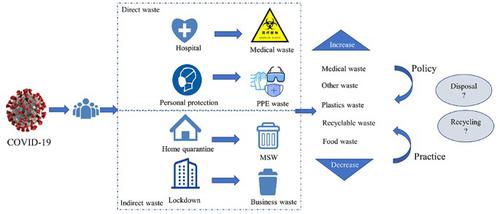Frontiers of Environmental Science & Engineering ( IF 6.1 ) Pub Date : 2021-03-05 , DOI: 10.1007/s11783-021-1407-5 Yangyang Liang 1, 2 , Qingbin Song 3 , Naiqi Wu 1 , Jinhui Li 2 , Yuan Zhong 3 , Wenlei Zeng 3

|
It has been over ten months since the beginning of the 2019 coronavirus disease (COVID-2019), and its impact on solid waste management, especially medical waste, is becoming clearer. This study systematically reviews the potential influences of the COVID-19 pandemic on medical waste, personal protection equipment waste and municipal solid waste (MSW), and discusses the corresponding measures and policies of solid waste management in typical countries. The results show that the generation of medical waste from the pandemic increased significantly, with 18%–425% growth. It is estimated that the daily output of COVID-19 medical waste increased from 200 t/d on Feb. 22 to over 29000 t/d at the end of September 2020 throughout the world. The use of personal protective equipment will continue to grow in the long-term, while the blockade and isolation measures greatly reduced the volume of commercial waste, especially for tourist cities, and part of this waste was transferred to household waste. Residents’ attitudes and behavior toward food waste have changed due to the COVID-19 pandemic. In response to the pandemic, international organizations and several countries have issued new policies and guidelines and adjusted their management strategies for medical waste and MSW treatment. The pandemic has brought specific challenges to the disposal capacity of medical waste worldwide. It has also brought about the stagnation of policies related to the reduction of plastic products and waste recycling. This study will provide some useful information for managers and governmental officials on effective solid waste management during and after the COVID-19 pandemic.
中文翻译:

COVID-19 大流行对固体废物产生和管理策略的影响
2019年冠状病毒病(COVID-2019)爆发已有十多个月,其对固体废物管理特别是医疗废物的影响日渐清晰。本研究系统回顾了COVID-19大流行对医疗废物、个人防护设备废物和城市固体废物(MSW)的潜在影响,并讨论了典型国家固体废物管理的相应措施和政策。结果显示,疫情造成的医疗废物产生量大幅增加,增幅达18%~425%。据估计,全球COVID-19医疗废物的日产量从2月22日的200吨/天增加到2020年9月底的29000吨/天以上。从长远来看,个人防护装备的使用将持续增长,而封锁和隔离措施大大减少了商业垃圾的数量,特别是对于旅游城市,其中部分垃圾转为生活垃圾。由于 COVID-19 大流行,居民对食物浪费的态度和行为发生了变化。为应对疫情,国际组织和多个国家发布了新的政策和指南,调整了医疗废物和生活垃圾处理的管理策略。疫情给全球医疗废物处理能力带来了具体挑战。它还带来了塑料制品减量和废物回收相关政策的停滞。这项研究将为管理人员和政府官员提供一些关于 COVID-19 大流行期间和之后有效固体废物管理的有用信息。











































 京公网安备 11010802027423号
京公网安备 11010802027423号